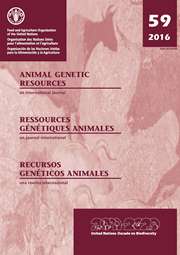The Twelfth Regular Session of the Commission on Genetic Resources for Food and Agriculture took place in Rome in October 2009. The meeting represented an opportunity for the 171 member countries of the Commission to review progress made in the implementation of the Global Plan of Action for Animal Genetic Resources. The Commission also adopted a Funding Strategy for the implementation of the Global Plan of Action and urged donors to enhance their financial support, and requested FAO to implement it. The report of the Twelfth Regular Session is now available on the Commission's Web site.Footnote 1
As the negotiations of the International Regime on Access and Benefit-sharing within the Convention on Biological Diversity are expected to be concluded in 2010, the Commission meeting was preceded by a special information seminar on policies and arrangements for access and benefit-sharing. A number of papers on the topic were prepared and are available on the Commission's Web site. These include a paper entitled The use and exchange of animal genetic resources for food and agriculture.Footnote 2 It concludes that in all regions, livestock keepers and breeders utilize animal genetic resources for food and agriculture (AnGR) that originated in other regions. The current pattern of international exchange of genetic material in livestock species is rather one-sided: the transfer of genetic material from the developed “North” to the developing “South” and between the regions of the North is far greater than that occurring from South to North. Livestock keepers remain the main custodians of AnGR diversity and only few AnGR are held in the public domain. Most exchange takes place on the basis of private contracts or informal arrangements between individuals or companies. Unless otherwise specified in the contract, the assumption is normally that the owners of the breeding animals (or other genetic material) acquired through such exchanges are permitted to use the genetic resources involved for further breeding as they wish. International exchange of AnGR is at present little affected by regulatory frameworks except in zoosanitary matters. Sector-specific national access legislation is rare and there is no legally binding international legal framework specifically for the AnGR sector. It is obvious that as the structure of the animal breeding sector and patterns of exchange of genetic material differ greatly from those prevailing in the crop sector, the provisions for plant genetic resources cannot simply be transferred to the livestock sector.
The Commission adopted a resolution on policies and arrangements for access and benefit-sharing for genetic resources for food and agriculture. The resolution notes, inter alia, the interdependence of countries regarding genetic resources for food and agriculture in that all countries depend on genetic resources originating elsewhere to address environmental, climate change, natural resource, sustainable development and food security challenges. The resolution highlighted the need for cooperation among the various organizations and fora dealing with access and benefit sharing. It invites the Conference of the Parties of the Convention on Biological Diversity and its Ad Hoc Open-ended Working Group on Access and Benefit-sharing to take into account the special nature of agricultural biodiversity, in particular genetic resources for food and agriculture, their distinctive features, and problems needing distinctive solutions, noting that in developing policies they might consider sectoral approaches which allow for differential treatment of different sectors or sub-sectors of genetic resources, different genetic resources for food and agriculture, different activities or purposes for which they are carried out. It also invites these bodies to explore and assess options for the International Regime on Access and Benefit-sharing that allow for adequate flexibility to acknowledge and accommodate existing and future agreements relating to access and benefit-sharing developed in harmony with the Convention on Biological Diversity.
The outcome of the negotiations on the International Regime on Access and Benefit-sharing, at the Tenth Meeting of the Conference of the Parties of the Convention on Biological Diversity, to be held in Japan in October 2010, will be important for the livestock sector.
On another note, the Commission endorsed guidelines for Preparation of national strategies and action plans Footnote 3 and Breeding strategies for sustainable management of animal genetic resources Footnote 4, the first two in a series of publications being prepared by FAO to support countries in the implementation of the Global Plan of Action. These guidelines are the results of much committed effort during the last decade.


